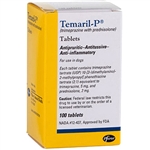Temaril-P Tablets
Antipruritic-Antitussive-Anti-inflammatory
Temaril-P (trimeprazine with prednisolone) is a unique formula that combines three therapeutic effects - antipruritic, antitussive and anti-inflammatory - to relieve the itch caused by allergic, inflammatory and parasitic dermatosis.
1. Antipruritic: TEMARIL-P is recommended for the relief of itching regardless of cause. Its usefulness has been demonstrated for the relief of itching and the reduction of inflammation commonly associated with most skin disorders of dogs such as the eczema caused by internal disorders, otitis, and dermatitis (allergic, parasitic, pustular, and nonspecific). It often relieves pruritus which does not respond to other therapy. With any pruritus treatment, the cause should be determined and corrected; otherwise, signs are likely to recur following discontinuance of therapy.
2. Antitussive: TEMARIL-P has been found to be effective therapy and adjunctive therapy in various cough conditions of dogs. Therefore, in addition to its Antipruritic action, TEMARIL-P is recommended for the treatment of "kennel cough" or tracheobronchitis, bronchitis including all allergic bronchitis and infections and coughs of nonspecific origin. (Coughs due to cardiac insufficiencies would not be expected to respond to TEMARIL-P therapy.) As with any Antitussive treatment, the etiology of the cough should be determined and eliminated if possible. Otherwise, symptoms are likely to recur following discontinuance of therapy.
Pharmacology:
Action: The exclusive TEMARIL-P formula combines the Antipruritic and Antitussive action of trimeprazine with the anti-inflammatory action of prednisolone. A therapeutic effect is attained by administering the tablets twice daily.
Note: TEMARIL-P may be administered to animals suffering from acute or chronic bacterial infections provided the infection is controlled by appropriate antibiotic or chemotherapeutic agents.
Dosage and Administration:
Recommended Dosage: The same dosage schedule may be followed for both Antipruritic and Antitussive therapy.
Initial dosage by weight:
- Up to 10 lbs . . . 1/2 tablet twice daily
- 11-20 lbs . . . 1 tablet twice daily
- 21-40 lbs . . . 2 tablets twice daily
- Over 40 lbs . . . 3 tablets twice daily
After 4 days, reduce dosage to 1/2 of the initial dose or to an amount just sufficient to maintain remission of symptoms. Individual animal response will vary and dosage should be adjusted until proper response is obtained.
Active Ingredients:
Composition: Each tablet contains trimeprazine tartrate (USP) 10-[3-(Dimethylamino)-2-methylpropyl] phenothiazine tartrate (2:1) equivalent to trimeprazine, 5 mg, and prednisolone, 2 mg.
Precautions:
Store in a dry, cool place at temperatures not above 25°C (77°F).
Cautions:
Federal law restricts this drug to use by or on the order of a licensed veterinarian.
All the cautions applicable to cortisone and to phenothiazine derivatives apply also to TEMARIL-P.
Prolonged treatment with TEMARIL-P must be withdrawn gradually. Use of corticosteroids, depending on dose, duration, and specific steroid, may result in inhibition of endogenous steroid production following drug withdrawal. In patients presently receiving or recently withdrawn from systemic steroid treatments, therapy with a rapidly acting corticosteroid should be considered in unusually stressful situations.
Warnings:
Clinical and experimental data have demonstrated that corticosteroids administered orally or by injection to animals may induce the first stage of parturition if used during the last trimester of pregnancy and may precipitate premature parturition followed by dystocia, fetal death, retained placenta, and metritis. Additionally, corticosteroids administered to dogs, rabbits, and rodents during pregnancy have resulted in cleft palate in offspring. Corticosteroids administered to dogs during pregnancy have also resulted in other congenital anomalies, including deformed forelegs, phocomelia, and anasarca. If a vasoconstrictor is needed, norepinephrine should be used in lieu of epinephrine. Phenothiazine derivatives may reverse the usual elevating action of epinephrine causing further lowering of blood pressure.
Side Effects:
Possible side effects attributable to corticosteroids include sodium retention and potassium loss, negative nitrogen balance, suppressed adrenal cortical function, delayed wound healing, osteoporosis, elevated levels of SGPT and SAP, and vomiting and diarrhea (occasionally bloody). Cushing's syndrome in dogs has been reported in association with prolonged or repeated steroid therapy. Possible increased susceptibility to bacterial invasion and/or the exacerbation of preexisting bacterial infection may occur in patients receiving corticosteroids. As noted above, however, this problem can be avoided by concomitant use of appropriate anti-infective agents. Possible side effects attributable to phenothiazine derivatives include sedation; protruding nictitating membrane; blood dyscrasias; intensification and prolongation of the action of analgesics, sedatives and general anesthetics; and potentiation of organophosphate toxicity and the activity of procaine hydrochloride.
It should be remembered that the premonitory signs of cortisone over-dosage, such as sodium retention and edema, may not occur with prednisolone. Therefore, the veterinarians must be alert to detect less obvious side effects, such as blood dyscrasias, polydipsia and polyuria.
The appearance and severity of side effects are dose related and are minimal at the recommended dosage level. If troublesome side effects are encountered, the dosage of TEMARIL-P should be reduced and discontinued unless the severity of the condition being treated makes its relief paramount.
How Supplied: 100 tablet bottle
Pfizer Animal Health


